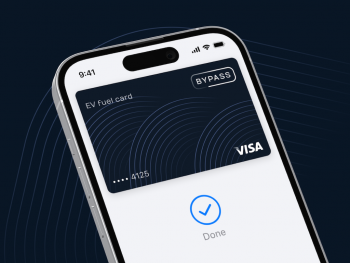Pay at any public charger with new EV fuel card
A new EV fuel card that enables drivers to pay at any public charger across the UK – and automatically get the VAT receipt back – is launching for fleets.

Fleets can use Bypass cards to pay at any public charger
The new ‘Bypass’ card is accepted at all public charging networks – from BP to Shell and Ionity – negating the need for drivers to arm themselves with multiple apps and cards.
And the developers say their ‘iterative’ approach of product development will ensure upcoming charging challenges are taken care of as the fleet EV sector evolves.
The company was founded by Jamie Sunderland and Grant MacLennan, drawing on their backgrounds in building software and enterprise-grade technology for large PLCs and companies across Europe and the US. Their work brought them into contact with the electric vehicle sector and the duo recognised the need for public charging to be simplified with an innovative solution that adds value to business fleets.
Already trialled with a large number of vehicle operators, the Bypass EV fuel card becomes widely available in June – and according to the firm, it “offers more chargers than roaming cards and less hassle than credit cards”. It includes all the UK’s top rapid chargers to minimise driver downtime.
Speaking exclusively to Fleet World, MacLennan explained how the card works differently to others in the marketplace.
“So, our first product is a super simple, contactless card that lives inside your Apple Pay or your Google wallet, the fleet driver uses it to charge at charging stations and the business pays for that charge. We then automatically reconcile it into a dashboard that pushes it into the fleet’s accountancy system, which then automatically represents a 20% reclaim on the charge.
“The value we add there is getting the VAT receipt. Some charging platforms are good in that you enter some details and get the receipt back but with others you have to email them for months. That’s where we can help provide extra value on the card.”
The fact that the card can be used at any public charge point is also a significant plus and draws on government work to mandate contactless payment at charge points.
MacLennan picked up: “There are other platforms that have tried to build an aggregation layer. So, one RFID card that works on a number of platforms. But they never work on all of them.
“Our point of view is that such an aggregation layer already exists and it’s called the payment layer. So, our card can be used at any contactless terminal on any fast charger, but it can also be used on slow chargers through WebPay or the 16 digits can be put into an app or used in RFID accounts, if that’s required.
“That means we can offer 100% coverage of all EV chargers because any charger that takes payment can take the Bypass card.”
It’s aimed at all types of vehicles and all size fleets, from small to large, and other benefits include free issuance of unlimited cards. It also works a pay-per-use model, costing a fixed fee per transaction and receipt, and with no monthly, set-up or cancellation fees. Operators are just invoiced at the end of every month depending on their usage. There are also security features to control usage for limited time periods and instantly lock cards with no extra costs.
Sunderland continued: “We’re working with delivery, transportation and company car fleets who all share the need for public charging to be so much easier!”
He added that by coming from other sectors, the pair have been able to bring new ways of thinking to the sector.
“We’re not from the fleet industry or the traditional fuel card industry and I think we’re tackling the problems in a different way, taking the viewpoint of creating more an expense management platform for businesses. So, it’s about managing the charging expense and enabling drivers to make that expense at places they’re required to do so. I think that gives us an advantage in the market because EVs are so different to diesel and petrol vehicles that you need to have a different viewpoint.”
Home charging next on the agenda
Bypass may be just weeks away from the initial launch of the charge card, but the company is already working on the next development – expanding into home charging. And as with the charging card, it says it will take a novel approach to tackling current pain points.
MacLennan elaborated: “Home charging is the next thing we’re working on. We’re already built technical prototypes in terms of integration to home chargers. Point being that we can easily calculate how much energy has gone from your home energy bill into the vehicle.
“Now, there’s other people who do this, but we’re taking a slightly different stance where we connect to the car through its API and to the charger, which means we know it’s that vehicle that’s charging at home, detecting EV fuel fraud.
“This wasn’t a problem before when EV uptake was pretty low but will become a much larger problem. But many homes now have two EVs and fleets want to know which one they’re paying for the charging on.”
Bypass is offering demos of the technology to fleet operators, including delivery, transportation and company car fleets. More details are here.













Jamie Sunderland18. May, 2023
Thanks for publishing this Natalie.
If you’re part of a delivery, transportation and company car fleet we’d be happy to give you a demo.
You can register your interest on our website here: https://bypasscharge.com/